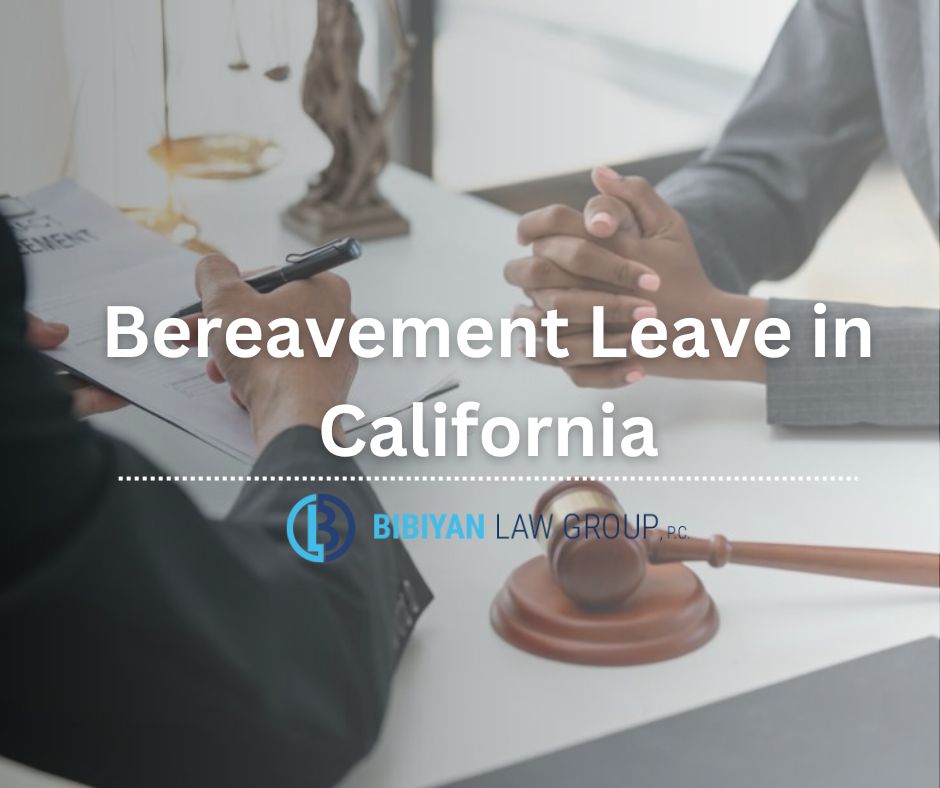
Losing a loved one is never easy, and when it happens, the last thing you should be worrying about is your job. That’s where bereavement leave in California comes in, offering you the space and support you need to cope with the loss of a family member. Starting January 1, 2023, California requires certain employers to provide eligible employees with bereavement leave.
To help you understand the new policy, our Los Angeles employment attorneys will break down the essentials of the bereavement leave policy in California, covering who qualifies, whether it’s mandatory, the need for proof, and what to do if an employer violates your bereavement leave rights.
What Is Bereavement Leave?
Bereavement leave is paid or unpaid time off from work that is provided to employees who are grieving the death of a loved one. It is a time for employees to attend funeral services, make arrangements, and find solace during this challenging time.
What Is California’s Bereavement Leave Policy?
California’s bereavement leave policy requires private employers with five or more employees to provide up to five days of paid or unpaid bereavement leave to eligible employees. Public employers, including the State of California and local governments, must also offer bereavement leave.
Bereavement leave must be used within three months of the family member’s passing. It can be taken intermittently, so you can use it as needed. For instance, you can take two days off initially to attend to immediate affairs and then later, perhaps a month down the line, take three more days off to attend a celebration of life service.
Employees can also use other available paid time off, such as vacation pay, personal leave, sick leave, or compensatory time off during their bereavement leave. There’s no annual cap on the number of days an employee can take for bereavement leave, meaning you can take up to five days each time you face such a situation. Your employer cannot force you to work on your bereavement leave days.
Who Qualifies for California Bereavement Leave?
Any employee with at least 30 days of employment is entitled to up to five days of bereavement leave. This applies to the death of a spouse, domestic partner, child, parent, sibling, grandparent, grandchild, parent-in-law, or grandparent-in-law.
However, the policy does not apply if you are covered under a collective bargaining agreement already providing a bereavement leave policy allowing for at least five days.
Do I Need to Provide Proof of the Death to My Employer?
Yes, your employer may request documentation of the death within 30 days of your first bereavement leave day. Death certificates, published obituaries, or written certifications of death, burial, or memorial services issued by a mortuary, funeral home, burial society, crematorium, religious institution, or state agency are acceptable.
What to Do If Your Employer Violates Your Bereavement Leave Rights?
If you believe that your employer has violated your rights to bereavement leave in California, there are steps you can take to defend your rights:
- Review your company’s policies. Review your employer’s bereavement leave policy to ensure you fully understand the requirements. Make sure you have complied with any necessary notification or documentation requirements.
- Discuss the issue. If you believe your rights were violated, you should have an open and respectful conversation with your employer or HR department. Share your concerns and provide any evidence you have to support your case.
- Document everything. It’s crucial to keep records of all your communications with your employer regarding the issue. This includes emails, notes from meetings, and any other relevant documents. These records may be valuable if you need to take further action.
- Contact a legal professional. If your employer continues to deny your leave, you should consult with a lawyer who focuses on labor and employment law. They can guide you on potential legal remedies.
- File a complaint. If necessary, you can file a complaint with the California Civil Rights Department (CRD) or the federal Department of Labor (DOL). The CRD will investigate potential violations of your workplace rights.
Your ability to address bereavement leave issues depends on your specific circumstances, so it’s essential to consult with an experienced attorney to determine the best course of action for your situation.
What Is Grievance Pay?
California grievance pay is money employees can get if their employer retaliates against them for filing a complaint or exercising their legal rights. For example, if your employer denies you bereavement leave or retaliates against you for taking bereavement leave, you may be eligible for California grievance pay.
You may also be eligible for California grievance pay if you suffer a loss because your employer violated your employment rights. In some cases, employees can even get grievance pay for emotional distress caused by their employer’s denial of bereavement leave.
Did Your Employer Deny Your Bereavement Leave?
If your employer denied your bereavement leave, contact Bibiyan Law Group, P.C. Our knowledgeable lawyers can represent your interests, explain your legal options, and pursue the compensation and justice you’re entitled to.
Our practice focuses on helping California employees. With a team of nearly 20 lawyers and 40 staff members, we have recovered tens of millions in unpaid wage settlements, and we’re known for our strict approach to litigation.Call us or complete our contact form for a free consultation. Hablamos Español.


